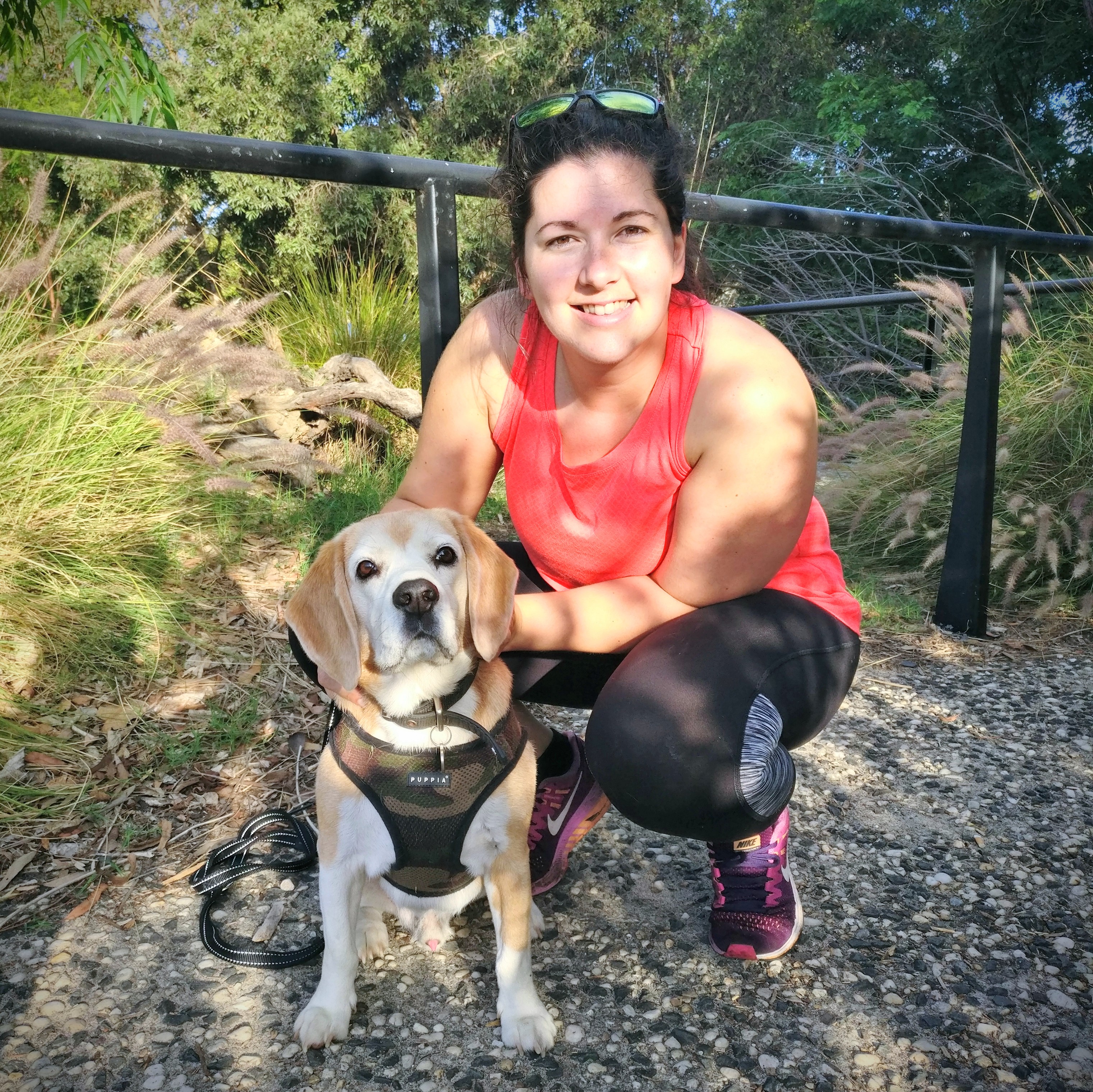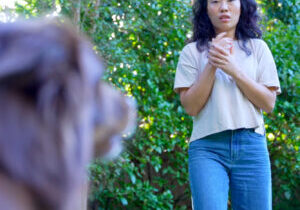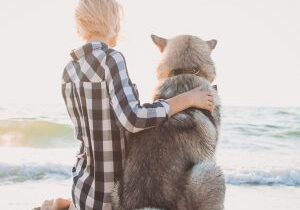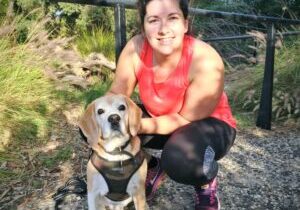Overcoming a lifelong fear of dogs: Rebecca's story

Rebecca got in touch to find out about getting help with her severe phobia of dogs, which was causing her a lot of distress and negatively impacting on her quality of life.
After completing the cynophobia therapy program, she was able to walk comfortably in an off-leash dog-park and interact confidently with dogs for the first time in her life.
Rebecca kindly offered to share her experiences in order to give other people with a fear of dogs an understanding of what therapy is like, from a client’s perspective.
This is the transcript of clinic director Anthony Berrick’s interview with her shortly after she had completed therapy.
Living with a fear of dogs
This is ridiculous – I’m twenty-seven years old and I’m climbing on a toilet to get away from a dog – I have to do something about this
Anthony: How long have you had a phobia of dogs, and what caused you to become fearful of dogs?
Rebecca: I’ve had a fear of dogs for over twenty years. At a young age I had a negative experience with a dog – I was playing in the front yard when a dog came in and knocked me over. Being such a small child, and this dog being quite large, it felt like this massive thing was attacking me and overpowering me, so it instilled that fear in me, even though I wasn’t bitten or hurt.
After that happened, my parents – obviously wanting to look after me – then kept me away from dogs and didn’t really let me experience or tackle the fear head-on. Then over time, that fear just built up and became bigger and bigger.
How did you feel around dogs – what were your phobia symptoms?
I would get hot and sweaty; heart palpitations. It was like a black cloud that would come over me and make my mind foggy. No matter what anyone would say to me, I couldn’t get out of it. I would just feel like I was going to have a heart attack or pass out every time I was around dogs. I’d think “this is it now – this is the end”.
Why did you decide to seek help with your fear of dogs?
I had a really bad experience when I was in a public bathroom at a beach, and somebody brought their dog in with them off the lead. My boyfriend shouted out to me that there was a dog and not to come out of the cubicle, and I remember feeling like there was no escape because I was trapped in the cubicle, so I climbed on top of the toilet in case the dog came under the door and attacked me.
That’s when I thought: “this is ridiculous – I’m twenty-seven years old and I’m climbing on a toilet to get away from a dog – I have to do something about this”. This is a very dog-friendly country, the lifestyle here is about being outdoors and there are lots of dogs around, so if I want to have a good life here, I need to be okay with dogs.
Why didn’t you seek help before?
I didn’t believe that it could be fixed. I just felt that this fear was so big that I couldn’t imagine ever being okay with dogs. I could only ever see this fear and couldn’t see a way past it. I wanted help but I was embarrassed and I didn’t think people would understand.
Also, I was worried about being pushed – in the past I’ve had friends with dogs who have tried to help, but it’s very hard for other people to understand, so they end up making it worse. So I thought there was nothing that could fix it, and I just gave up hope really.
Getting evidence-based therapy
I was never put in a situation where I felt it was too far, or I would be pushed.
What other things had you tried doing to overcome your phobia before exposure therapy?
I went through a full course of hypnotherapy on two separate occasions – eight to ten sessions each time. I have family members who have done hypnotherapy, and it’s worked for them, but I think it depends on the fear.
If you have time to prepare for the situation, like with a fear of heights or flying, it could be helpful, but dogs can appear at any moment and I can’t say to a dog “just hold on a minute please, while I do my counting, before you come near me”. So, for me, hypnotherapy didn’t work.
How would you explain exposure therapy to someone who’s never done it before?
I’d say it was like slowly ‘testing’ myself – I was never put in a situation where I felt it was too far, or I would be pushed. Exposure therapy for me was about building up my confidence with lots and lots of little steps, which eventually over time enabled me to conquer each aspect of my fear.
I suppose it’s a bit like when you’re a kid and you get gold stars for doing good work – it makes you want to keep going and achieve your goal. When I’d come out of the therapy session, I’d feel so elated.
With a dog, the more you spend time with them and learn about them, the more you realise there’s nothing to be afraid of, and the fear starts to fade from your mind.
What was the ‘highlight’ of the therapy for you?
The biggest highlight for me was actually at the beginning of the therapy, not the end. I remember coming out of that first session – that was my proudest moment, the first time in my life that I’d ever fed a dog – thinking “oh my god, I might actually be able to do this” and I was just absolutely buzzing, because for so long I’d thought I couldn’t do it, and that it was never going to change.
The other big moment was when we went for a walk in the park with dogs everywhere and I felt like it was just normal – I didn’t have those anxious feelings at all.
What would you say to someone who is considering therapy but is very anxious about doing exposure therapy?
I genuinely believe a lot of it is down to trust – you need to trust the person who’s helping you. To be honest, before we first met I was still very nervous about it. I thought I would be thrown in the deep end, and I had this image in my head of you putting me in a room with a dog and shutting the door!
So for anyone who’s considering therapy, I would tell them to talk it through with the psychologist and be clear about what’s involved, so you feel confident that you’re in a safe environment.
Getting that email back from you, after I first contacted you, where you said I won’t be put in any situations where I don’t feel comfortable or pushed beyond my limits, that we only progress when I’m ready to, and we do it on my terms, was so important.
During the therapy itself, I always felt like I was in a safe place, so I never felt uncomfortable. It was a controlled environment working with just one dog, to begin with, which allowed me to get to know the dog. Then once you get used to one dog, you can get used to two, and three, and so on.
Life after cynophobia
I thought maybe after therapy I would be okay with dogs... but this is beyond what I had hoped for.
How do you feel around dogs now?
Honestly, great. I’ve learned to appreciate what it is that people love about dogs. It’s been quite an emotional time for me because I feel like I’ve missed out on so much for so long, not really understanding why people like dogs, because I could only see the fear – I couldn’t see the good side.
Now I smile when I see dogs, and I want to go over to them and meet them. Every so often, I’ll see a dog that I’m not one-hundred percent sure about, but I don’t have that fear anymore.
I thought maybe after therapy I would be okay with dogs, but I’d never really be great with them, but this is beyond what I had hoped for. My boyfriend and I even talk about what kind of dog we’ll get in the future. If you’d asked me four months ago, I would have said “no way in hell will I ever get a dog!”
What difference has this therapy made to your life?
It’s massively changed my life. It makes such a difference. Before, I couldn’t go to beaches, or for walks in certain places, because I knew there’d be dogs. Or I’d be out, and come across a dog, and I’d have an absolute fit and have to go home.
There were times when I’d be at a park with my friends and I could only stay for five minutes because there were dogs in the area. Now I get to live my life more – it’s made a huge, huge difference.
(02) 9191 1523 • info@thecynophobiaclinic.com.au • St Ives NSW 2075
(02) 9191 1523
info@thecynophobiaclinic.com.au
St Ives NSW 2075




